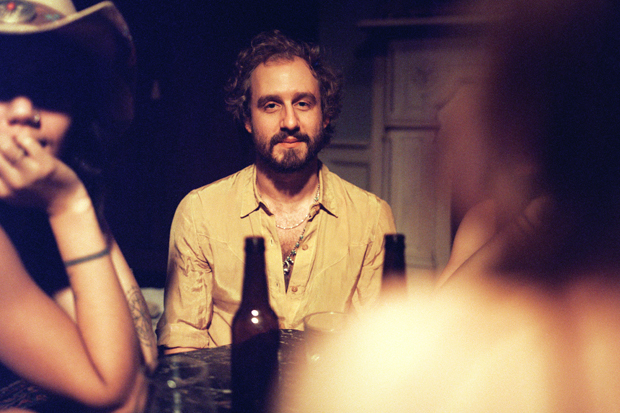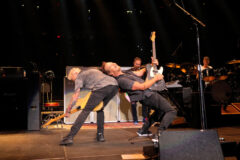Matthew Houck, known to fans as Phosphorescent, makes woozy folk rock propelled by his singular, beleaguered warble. But that’s not to say he’s another shapeless Neil Young disciple. Houck’s never been afraid to breach the confines of his form, frequently unleashing squalling horn lines and toying with dense Beatles-esque overdubs. Yet the Brooklyn-based singer-songwriter is at home with more traditional sounds, too, as he made clear with his 2009 Willie Nelson homage, To Willie. His new record, Muchacho, out March 19 on Dead Oceans, deploys a paradoxically successful blend of exalted aspiration and deep despair.
The reticent, soft-spoken Houck talked to SPIN about his musical growth, gift for melancholy, and getting his gear stolen.
Muchacho, and your music in general, is so much about the divide between dark lyrics and more upbeat, playful arrangements. Is that just a natural juxtaposition for you?
I don’t think about it in terms of planning it out with that kind of mind frame. A lot of times they just go hand-in-hand. When you’re writing the songs, it just naturally happens. It’s not so much that you’re consciously making the decision each time around to decide on a chord progression. Somehow that happens automatically. I’ve been writing songs for a lot of years now. If I do make those conscious decisions, it’s in the production process, where you decide to have a horn break, or an uplifting choir, or something like that.
You produced the album yourself. How did that influence the final result?
Hopefully, the main difference would be ability. I think you get better at doing stuff as you practice, by just doing the work. I’ve learned a thing or two about how to make records. For the first time I was able to buy some older, analog gear that really contributed to the sound being richer. Hopefully the production is the next level up.
Production-wise, was there any music in particular that you found inspiring when you were working on the album?
Yeah, well, I started off listening to the ’70s Brian Eno albums, and I think those were in my mind when I started working on the record. But during the six months of making the album, I don’t think I listened to any other music at all once the record got rolling. It definitely became all encompassing.
How much did the songs change shape throughout the process of making Muchacho?
At first, I think I was looking for certain sounds. The big change for me that happened, where all of a sudden it became so insane, was the combination of all the instruments. I made it piece by piece. Every instrument that’s on there, I basically had the person who played it in the studio for one day at a time. Like, I did all the fiddles in one day. So once I tracked the horns in one day, I’d lay them all over every track. The way it shifted for me was hearing, all of a sudden, what the songs sounded like. It wasn’t so much me manhandling them into a direction but actually listening; they had their own voice at a certain point.
The album starts with “Sun, Arise! (An Invocation, An Introduction)” and ends with “Sun’s Arising (A Koan, An Exit).” Tell me about those bookends.
That was another thing about trying to couch what I consider some dark material and subject matter in these songs. It was a specific attempt to have something ascending towards light at both the beginning and the end. The logical thing would have been to have a sunrise and sunset to close the cycle out, but I definitely didn’t want to do that. It was important to me to have a sunrise at the beginning and then again at the end. Moving away from the darkness was the key.
Do you have a specific songwriting process?
The inspirations come from all over the place. But the finishing of songs, at least for this record, did require a specific period of sitting down. So in the beginning, lyric and melody would come together at the same time. Maybe a verse would happen, or a chorus line. I wasn’t being that disciplined at that time, so I had all these bits of songs. And then there was definitely a period of about a month that required just sitting down and acting as a writer.
In 2010, your gear was stolen in Brooklyn after a gig. Did losing the tools of your trade have an effect on your output?
I don’t think so, actually. That was such a harrowing experience that I just blocked it out. Luckily that story had a happy ending and we ended up recovering everything. It was a big, hairy few days, where everything was gone and we had a tour booked. I think I’ve put a mental block up around that time.
Last question, and it’s hard-hitting: Why’d you call the album Muchacho?
“Muchacho’s Tune” was the first song I finished for this record. I had been down in Mexico in order to do some writing for a week. And I think the Spanish language and being in Mexico, it all coincided into that song. That song, for me, is the centerpiece.





